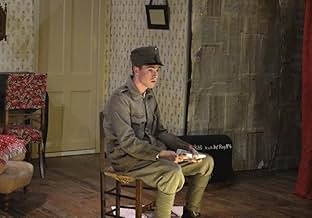Ajouter une intrigue dans votre langueIn WWI a Czech civilian is forced into the conquering Austrian army. Everywhere he goes, everything he is ordered to do becomes a disaster for the Austrians. Is Schwejk astoundingly stupid o... Tout lireIn WWI a Czech civilian is forced into the conquering Austrian army. Everywhere he goes, everything he is ordered to do becomes a disaster for the Austrians. Is Schwejk astoundingly stupid or deviously defiant?In WWI a Czech civilian is forced into the conquering Austrian army. Everywhere he goes, everything he is ordered to do becomes a disaster for the Austrians. Is Schwejk astoundingly stupid or deviously defiant?
Histoire
Le saviez-vous
- Bandes originalesPiano Sonata No. 11, K. 331 / 300i, Movement 3 - Rondo alla turca (Turkish March)
Written by Wolfgang Amadeus Mozart
Arranged for accordion by Michel Sanvoisin
Performed by Junchi Deng
Commentaire à la une
Here she comes, Britain's leading independent and 100% original filmmaker, stirring things up again. Christine Edzard has this time adapted the famous anti-war satire novel by Jaroslav Hasek and directed a thoroughly different kind of film than anyone has ever seen before. She first came to prominence in 1971 by writing, jointly with her husband Richard Goodwin, the film TALES OF BEATRIX POTTER, which was wildly popular in Britain (which is Beatrix Potter country) and starred the famous ballet choreographer Fred Ashton as Mrs. Tiggy-Winkle (one of those delightful eccentric touches in which the British specialize). Then in 1987 she directed a superb TV series of LITTLE DORRIT by Dickens, starring Alec Guinness and Derek Jacobi, which people talked about for years afterwards. (The BBC made another excellent series of this tale in 2008, notable in particular for the knock-out performances by Matthew Mafadyen and Claire Foy.) In 1990, she directed and co-wrote the film THE FOOL which greatly impressed critics and the chatterati but did not make a lot of money, which as we know is a bit of a downer when one wants to continue getting funding for daring projects. With some Shakespeare film projects and various other activities in between, this brings us to today. Schwejk (pronounced 'Schvike', to rhyme with 'Ike', the pet name of President Eisenhower) is the name of the anti-hero of this Czech classic. The novel, which is more of a hodge podge than a novel, has been filmed several times: as a silent film in Czech (1926), as a comedy film in Romanian (1953), as a feature-length puppet film in Czech (1955), as a two-part Czech series (1957), as a comedy film in German (1960), as a British TV film with Joss Ackland (1965), and as a feature length cartoon film in Russian (2010). But in all these instances, Schwejk was portrayed as a comical and podgy older man. Edzard discovered that this was inaccurate, and that the real-life model for the character was a 25 year-old soldier whom Hasek had known, and of whom a photo survives. She therefore took the decision to portray Schweyk correctly for the first time as a young man, and by brilliant casting she and her producer Olivier Stockman chose 25 year-old Alfie Stewart to play the lead role. He is absolutely perfect. He is innocently mischievous, unintentionally both wise and irreverent, and a young fool who is cleverer than his idiot officers. So at last we have something close to the novelist's true intentions. The rest of the cast are also excellent, and they double up on many roles, giving the production a refreshing feel of teamwork and improvisation, as if it had all just occurred to them. And this exactly fits the bizarre and risky production concept of the entire film, an approach so daring that it could easily have failed miserably. For the film is of a stage version of the story in which there is genuine audience participation, including some of the actors from time to time rising up amongst the audience and speaking. There are also many cutaways of audience reaction, to give the feel of a live event. Inside the remarkable Noah's Ark of a building at London's dock area Rotherhithe beside the Thames where Edzard, Stockman, Woodward, & Co. carry on their period costume business, photo archive, film club (which takes place in a room full of spacious armchairs), and film studio and production activities, there is also a reproduction period proscenium stage and theatre with plush seats. The entire building, and the theatre as well, are a bit of a fantasy, and one might say that the building has one of the most remarkable interiors in the whole of England. Words do not suffice to describe the interior of the Sands Films Ark. One has to see it to believe it. They even have a curio cabinet displaying items found by them acting as mudlarks in the river bed at low tide, ranging from Anglo-Saxon times to the present. In the theatre, they staged SCHWEYK numerous times with live audiences, to get the shots from all the angles, the closeups, etc. and then edited it all together so that it becomes an amalgam of live and real, an alloy of stage and film. There is no attempt at verisimilitude for the film as a whole, but in the more intense sections where the camera concentrates on the action itself, one periodically forgets that this is a filmed play, and it seems like a movie. Well, it is a movie, of course. But it is a new kind of hybrid. I heard that this film had been completed and was being shown privately in the same theatre where it was filmed, so went along to see this remarkable event, introduced in person by the producer. So there we were applauding the audience who were applauding the performance which had taken place in the same space at a different time. Einstein would have remarked: 'But I always said that space-time was curved.' Does the film work? I think they pulled it off and that it does. It certainly has joie de vivre and plenty of raw energy. People who don't like stepping back from an illusion may be annoyed that the production is treated as a shared performance event rather than as an immersive drama. But then, the book was crazy, and the production is only being true to the author's wacky vision. Yes, it works, but an appropriate trigger warning would be: contains moments of extreme irreverence to convention and wild satire. Humourless people need not apply.
- robert-temple-1
- 4 févr. 2019
- Permalien
Meilleurs choix
Connectez-vous pour évaluer et suivre la liste de favoris afin de recevoir des recommandations personnalisées
Détails
- Durée1 heure 52 minutes
- Couleur
Contribuer à cette page
Suggérer une modification ou ajouter du contenu manquant

Lacune principale
By what name was The Good Soldier Schwejk (2018) officially released in Canada in English?
Répondre




















